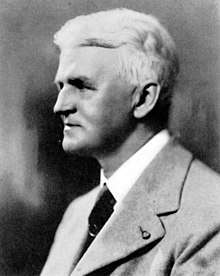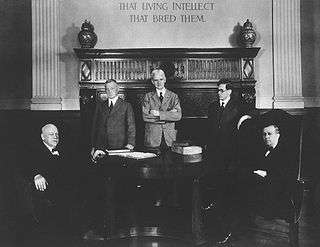John Rathbone Oliver
John Rathbone Oliver (January 4, 1872 – January 21, 1943) was an American psychiatrist, medical historian, author, and priest.[1] His novel Victim and Victor was a contender for the 1929 Pulitzer Prize for Fiction, but the award went to Julia Peterkin's Scarlet Sister Mary.[2]


Biography
Oliver was born in Albany, New York in 1872; his father Robert Shaw Oliver later served as assistant secretary of war. Oliver graduated from Harvard University in 1894 where he served as editor-in-chief of The Harvard Monthly. He taught at St. Paul's School in Concord, New Hampshire from 1894 to 1897. He entered the General Theological Seminary, became a priest in 1900, and served at St. Mark's Church in Philadelphia until 1903. He left the priesthood in 1903, likely due to coming to terms with being gay.[3]
He obtained his M.D. from the University of Innsbruck in 1910, and served in the Austrian Army in 1914-15. Returning to the United States in 1915, he was chief medical officer for the Supreme Bench of Baltimore from 1917 to 1930 and was a psychiatrist at Johns Hopkins University Hospital. He was also a professor of the History of Medicine at the University of Maryland and an associate professor at Johns Hopkins (where he received a Ph.D. in 1927) from 1930 to 1939.[4] He returned to the priesthood in 1927.[2]
After retiring in 1940 in poor health, Oliver died in Waverley, Massachusetts at the age of 71 on January 21, 1941, survived by two sisters.[4][5]
Writings
Oliver wrote several novels, and a number of non-fiction works on psychiatry and criminology.
In 1929, Oliver's novel Victim and Victor was the first place choice of the jury committee to receive the Pulitzer Prize for Fiction. The jury's chair Richard Burton already spoken favorably of the book in public, and premature press reports thought it had won.[6] However, the Pulitzer committee rejected the recommendation in favor of Julia Peterkin's Scarlet Sister Mary, and Burton declined reappointment to the jury in the future.[7] The novel is a fictionalized account of his leaving the priesthood and his attempts to return.
Works by John Rathbone Oliver
- The Good Shepherd (1913) (under pseudonym John Roland)
- The Adventures of Cigarette (1915) (as John Roland)
- The Six Pointed Cross in the Dust (1915) (as John Roland)[8]
- Fear--The Autobiography of James Edwards (fiction) (1927)[9][10]
- Victor and Victim (1928)
- Foursquare: The Story of a Fourfold Life (autobiography) (1929)[11]
- Rock and Sand (1930) (novel)
- Article 32 (1931) (novel)
- Psychiatry and Mental Health (1932) (non-fiction)[12][13]
- Priest or Pagan (1933) (fiction)
- The Ordinary Difficulties of Everyday People (1935)[14]
- Greater Love (1936) (fiction)[15]
References
- "JOHN R. OLIVLR, M.D. : The Journal of Nervous and Mental Disease". Journals.lww.com. 2015-09-01. Retrieved 2016-06-12.
- Butterly, George P., Jr. (2 June 1929). A Clergyman Who Is A Doctor, Brooklyn Eagle Magazine, p. 10
- Miscellany: John Rathbone Oliver--In Progress, Duke Gay Alliance Morning Star (April 1975)
- (31 January 1943). Deaths, The Living Church, Vol. 106, No. 5, p. 4
- (22 January 1943). John Oliver Dies; A Psychiatrist, 71; Medical Historian Associate Professor at Johns Hopkins from 1930 to 1939; Author and Clergyman; Ordained in Episcopal Church in 1900--Once a Surgeon in the Austrian Army, The New York Times
- (17 April 1929). Denies Oliver Novel Wins Pulitzer Prize, The New York Times
- Verdelle, A.J. Foreword to Scarlet Sister Mary, p. 30 (1988, University of Georgia Press edition)
- Harvard College Class of 1894- Twenty-Fifth Anniversary Report, p. 600 (1919)
- Nathan, Israeli. Review of Fear--the autobiography of James Edwards, The Journal of Abnormal and Social Psychology, Vol 23(4), Jan 1929, 507
- (27 March 1927). Psychiatric Fiction (review), The New York Times
- (22 December 1929). A Novelist Who Believes in the Rounded Life - Foursquare review, The New York Times
- (18 July 1932). Lays Rise in Crime to Broken Homes - Dr. J.R. Oliver Says 70% of Young Criminals Lack Any Normal Family Life, The New York Times
- Lowrey, Lawson G. Review of Psychiatry and Mental Health, American Journal of Orthopsychiatry, Vol 3(1), Jan 1933, 94.
- (11 August 1935). The Ordinary Difficulties of Everyday People (review), The New York Times
- Field, Louise Maunsell (8 March 1936). Other People's Business - Greater Love (review), The New York Times
External links
- The John Rathbone Oliver Collection at Johns Hopkins
- John Rathbone Oliver Criminological Collection, at Harvard University